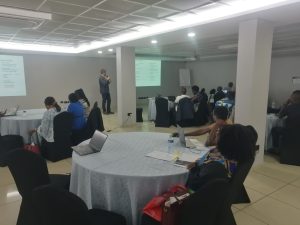By Buertey Francis BORYOR
A national policy and community engagement workshop on climate vulnerability and resilience has been held in Accra- with a call for stronger collaboration among policymakers, researchers, and communities to strengthen the country’s climate adaptation efforts.
The workshop, organised by AGRA Ghana on Tuesday, October 7, 2025, was themed, ‘Strengthening Climate Adaptation through Evidence-Based Policy and Community Action.’
The event formed part of AGRA’s Strategy 3.0 and the broader continental climate adaptation agenda- and aimed to ensure that evidence from climate risk and vulnerability analysis directly informs adaptation planning, policy reforms, and local actions.
Participants included government officials from agriculture, environment and planning sectors, farmer organisations, researchers, youth and women’s groups, NGOs, private sector representatives, and the media.
Opening the session, Dr. Godfred Seidu Jasaw, Chairman of the Parliamentary Select Committee on Food, Agriculture and Cocoa Affairs, commended AGRA and its partners for developing the climate vulnerability and risk mapping tool.
He said such data-driven tools are essential to help the country identify communities most at risk from climate shocks and design tailored responses.
He noted that changing rainfall patterns, floods, and droughts continue to disrupt farming seasons and threaten food security in the country. According to him, “vulnerability maps must not sit on shelves- they must guide real decisions that improve farmers’ lives.”

Dr. Jasaw urged the media to help raise awareness of the vulnerability maps and their practical uses for farmers and local governments. He said widespread understanding of the tool would strengthen accountability and encourage action at all levels.
Dr. Jeremiah Rogito, AGRA’s Soil Health and Climate Specialist, outlined the technical design and purpose of the mapping tool. He explained that it will produce high-resolution maps and risk profiles to guide policymakers, extension officers, and farmer organisations on where to target investments and which crops to prioritise.
Developed in collaboration with Mathematica and EDI Global, and funded by the Bill & Melinda Gates Foundation, the tool is being implemented in five African countries, including Ghana.
He noted that, the project will begin with maize and cassava, two crops that are vital to the country’s food security and rural livelihoods.
“The tool is critical to Africa’s future. It will help identify where interventions are most needed, where resources should go, and how we can build resilience at every level,” Dr. Rogito said.
He added that AGRA will support regional and district-level engagements to ensure that the tool’s findings are shared widely and applied effectively across the country.
He underscored the need for inclusive participation in climate adaptation planning and also noted that- using data alone will not be enough to solve the country’s climate problems. “More awareness, strong partnerships, and consistent funding are needed to turn research into real action,” he said.
Moreover, he called for more partnerships between government, academia, and the private sector to ensure sustainability. “The private sector can play a crucial role by investing in climate-smart technologies, early warning systems, and smallholder support services,” added.
Discussions also focused on the importance of linking scientific evidence to policy decisions, improving local governance structures, and building community capacity to act on climate information, among others.










